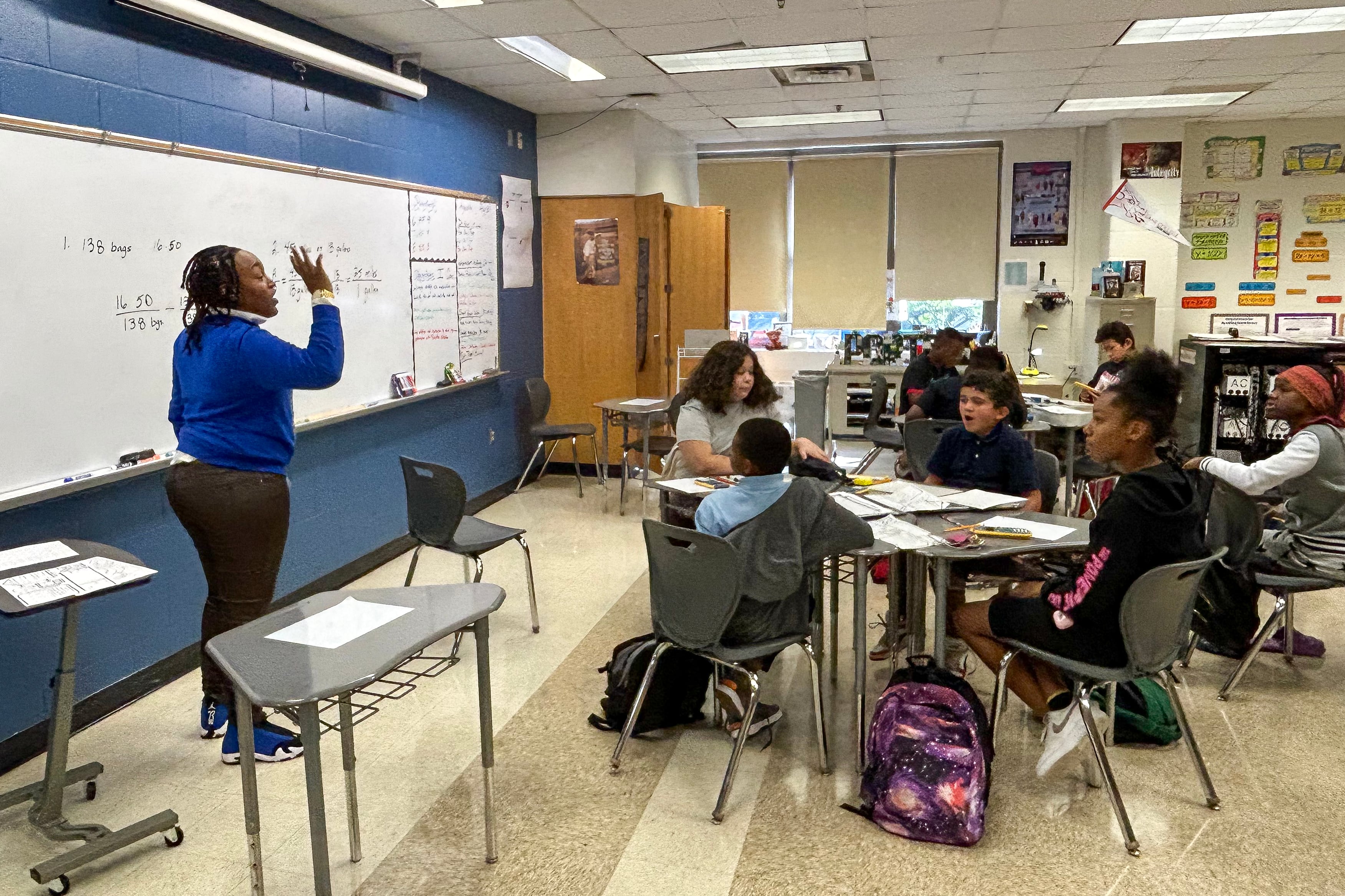Sign up for Chalkbeat Indiana’s free daily newsletter to keep up with Indianapolis Public Schools, Marion County’s township districts, and statewide education news.
The Indianapolis Public Schools board approved an operating budget for next school year that will prioritize staff pay raises, literacy programming, support for English language learners, and the district’s Rebuilding Stronger reorganization plan.
The projected $456 million spending plan adopted by the IPS board Thursday is $10 million more than projected spending for this school year. The figure excludes any debt that the district pays annually for capital expenses.
The board approved the budget for the 2024-25 school year by a unanimous vote.
Here are four main takeaways from the budget:
Budget priorities include teacher pay, literacy
Raises outlined in new teacher and support staff contracts approved this school year are one of the district’s funding priorities. Teachers received an average 3% increase in pay in the two-year contract approved in 2023, plus stipends for hard-to-fill positions such as special education and English as a New Language teachers. Support staff received an average increase of 7.4%, boosting starting pay from $11.01 per hour to $16.01.
The district’s Rebuilding Stronger plan is also a top priority. The plan will expand specialized academic programming like STEM, Montessori, and Reggio Emilia learning models into schools throughout the district. It also requires training for staff in these academic models.
It has also required financial incentives for staff and marketing for families to entice both parties to stay in the district, as the plan calls for the break up of K-8 schools that will send students and staff to new locations next year.
Other budget priorities include funding early literacy efforts as lawmakers have required districts to adopt curriculum based on the science of reading. Starting next year, third-grade students who do not pass the state’s IREAD test must also be held back in accordance with a new law.
The district this year launched training for staff on UFLI, a new reading skills curriculum, and LETRS, which also trains staff on the science of reading.
IPS also hopes to reorganize its English as a New Language program, a plan that calls for $2,000 stipends for teachers who lead these efforts in their school buildings.
Millions in property taxes will go to charter schools
The district will lose out on a projected $4 million in property taxes to charter schools in fiscal year 2025.
That’s due to a statute lawmakers passed last year dealing with charters and taxes. The 2023 law requires school districts in Marion County and three other counties to share increases in property tax revenues proportionally with charter schools in the county that enroll students living in the district.
And under a new law passed this year, IPS is limited in how much it may charge autonomous schools in its Innovation Network, the majority of which are charter schools. The district can’t charge more than the charter school receives in property tax revenues.
Chief Financial Officer Weston Young said in a statement that the district is still evaluating what the law passed this year will mean for IPS.
Enrollment and per-pupil funding projected to increase
IPS predicts a slight increase in the number of students in its non-charter schools, from 21,128 this school year to 21,420 next school year. Innovation charters are estimated to grow from 10,285 to 10,335 students.
Enrollment figures are critical for school districts, which receive funding based on student enrollment.
Per-pupil funding from the state includes a baseline amount plus more funding, known as “complexity” funding, for students from low-income backgrounds or those in foster care. Per-pupil funding for IPS stood at $8,060 this school year and is projected to be $8,170 next year, an increase of roughly 1.4%.
But IPS has seen a smaller proportion of its state support come from complexity funding in recent years, as the state has increased base funding for all districts.
The result, according to the district’s analysis, is that IPS has seen a smaller increase in per-pupil amounts from the state than its surrounding suburban districts.
IPS predicts financial crunch in a few years
Officials anticipate ending the fiscal year in June with $120 million in cash on hand.
The district still predicts a deficit in the cash balance for its education and operations fund around 2027, after federal COVID relief funds expire in September 2024 and money from a tax increase approved by voters in 2018 expires in 2026.
Officials have stressed that the district must make important decisions to alleviate the predicted deficit. The Rebuilding Stronger plan closed six schools operating under capacity and moved students into other schools in order to operate more efficiently.
Amelia Pak-Harvey covers Indianapolis and Lawrence Township schools for Chalkbeat Indiana. Contact Amelia at apak-harvey@chalkbeat.org.





